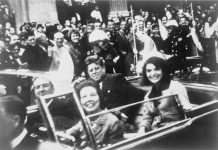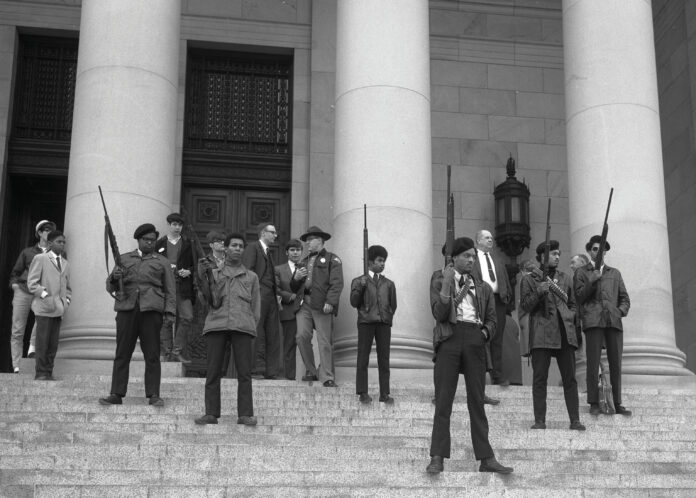
Linkbox med samling af links om Black Power og den afro-amerikanske kamp i USA + link til materiale fra Tidslinjen.
Socialistisk Bibliotek,
påbegyndt januar 2009
Indhold
Black Power
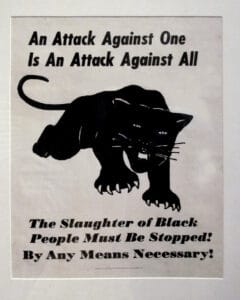
Oversigtsartikler:
- Black Nationalism (Wikipedia.org). Oversigtsartikel om de historiske “sorte” bevægelser, som Black Power er én af.
- Student Nonviolent Coordinating Committee (SNCC). Af Howard Zinn (Leksikon.org). Om bevægelsen, som Black Power udprang af.
- Black Power (Wikipedia.no). Kort intro på norsk
- Black Power. Af Helge Rønning (Leksikon.org). God dansk artikel.
- Black Power (Wikipedia.org). Lang uddybende artikel på engelsk
- Black Power. By C.L.R. James (Marxists Internet Archive/C.L.R. James Archive). Talk given by C L R James, London in 1967.
Stokely Michael and Black Power. “The strong slogan of “Black Power” was introduced in the liberation struggles of 1964’s voter registration march through Mississippi. Stokely Carmichael (1941-1998), as head of the Student Nonviolent Coordinating Committee, was credited with the spread of this slogan in many of the major protest marches of the 1960’s …” Video: BLACK AMERICA SINCE MLK: AND STILL I RISE | Episode 2 Scene: Reagan’s Policies & Black America | PBS. (YouTube, 2:14 min.)
See also:
Say it plain – A century of Great frican American Speeches (americanradioworks.publicradio.org)
Incl. speeches by Booker T. Washington, Marcus Garvey, Dich Gregory, Stokely Carmichael, Malcolm X: *he Ballot or the Bullet’, Martin Luther King Jr. and others.
Se også på Socialistisk Bibliotek:
- Tidslinjen: 23. februar 1868, om W.E.B. DuBois, medstifter af borgerrettighedsbevægelsen i USA og af den pan-afrikanske bevægelse.
- Tidslinjen: 27. april 1883, om Hubert Harrison, vestindisk-amerikanske politisk aktivist.
- Tidslinjen: 17. august 1887, om Marcus Garvey, afroamerikansk nationalist-leder.
- Tidslinjen: 12. februar 1909, om NAACP, første amerikanske borgerrettighedsorganisation.
- Tidslinjen: 2. august 1924, om James Baldwin, afroamerikansk forfatter.
- Tidslinjen: 20. juli 1925, om Franz Fanon, revolutionær kolonialisme-kritiker.
- Tidslinjen: 15. januar 1929, om Martin Luther King, baptispræst og borgerrettighedsforkæmper.
- Tidslinjen: 25. marts 1931, om Scottsboro-sagen (Alabama, USA).
- Tidslinjen: 1. december 1955, om Rosa Parks og busboycot i Alabama.
- Tidslinjen: 29. september 1957, om Little Rockoptøjerne, Arkansas.
- Tidslinjen: 1. februar 1960, om første Sit-in, butikskampagne i North Carolina.
- Tidslinjen: 4. maj 1961, om ‘Freedom Riders’ i USA’s Sydstater.
- Tidslinjen: 23. januar 1976, om Paul Robeson, afroamerikansk sanger
- Tidslinjen: 15. november 1998, om Kwame Ture / Stokely Carmichael.
- Tidslinjen: 9. august 2014, om Black Lives Matter.
- Linkboxen: C.L.R. James (1901-1989), om den vestindisk-britisk-amerikansk socialist.
- Linkboxen: Malcolm X (1925-1965), om den militante sorte muslimske leder Malcolm X.
Sorte Pantere / Black Panther Party
15. oktober 1966
Black Panther Party for Self-Defense stiftes i Oakland, Calif., USA, af Huey P. Newton and Bobby Seale, med et “Ten-Point Program”.
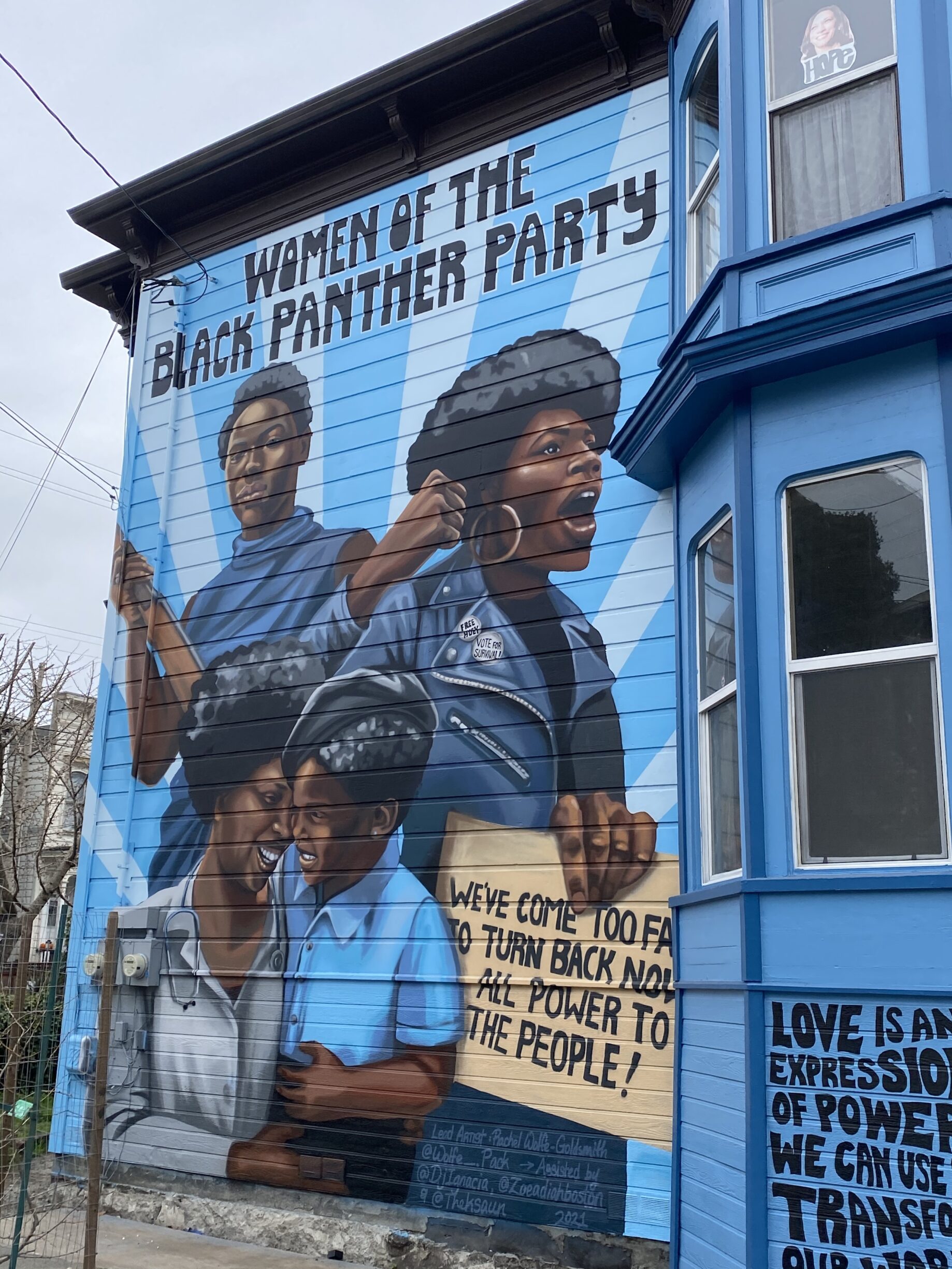
Se:
- Black Panthers Party (BPP) (Leksikon.org).
- Black Panther Party (Wikipedia.org).
Black Panther Party Newspaper (1967-1969) (Marxists Internet Archive). “The first two volumes of the paper is up. More to follow.” See also: The Black Panther (1969-1972) (Libcom.org) + Black Panther (1967-1970) (Internet Archive) + The Black Panther (1967-1995) (Freedom Archive).
Huey Speaks From Jail: Huey Newton talks to The Movement about the Black Panther Party, cultural nationalism, SNCC, Liberals and white Revolutionaries (pdf) (The Movement, Vol.4, No.7, August 1968, p.8-11; scroll down).
Samme interview: Interview with Huey P. Newton (1968) (Arbejdermuseet.dk, 16 s.). “Dette interview blev lavet, mens Huey P. Newton var fængslet.” Med enkelte noter på dansk.
The Black Panther Party (Marxists Internet Archive; History, USA). “The Panthers practiced militant self-defense of minority communities against the U.S. government, and fought to establish revolutionary socialism through mass organizing and community based programs.”
Intersectional Black Panther Party History Project (IPHP). “Created in July 2016 when four African American women historians, Angela Davis, LeBlanc-Ernest, Tracye Matthews, Mary Phillips, and Robyn C. Spencer, came together … about the need for deeper analysis of Panther women.”
Mumia Abu-Jamal: Ukuelige Black Panther aktivisters historie (Autonom Infoservice, 5. oktober 2023). “Den 5. oktober 1966 blev Black Panther Party stiftet i Oakland, California. I denne anledning bringer vi den fængslede revolutionære afro-amerikanske journalist Mumia Abu-Jamals baggrundshistorie om nogle Black Panther aktivister, som han kendte personligt: George Jackson og Ruchell ‘Cinque’ Magee.”
”Vi har en vision for os selv i denne verden og vi spørger ikke om lov” (Autonom Infoservice, 9. juni 2020). “Interview med Lynn French om kvinders rolle i Black Panther Party og om partiets moderne arv. Hun var bl.a. med til at grundlægge en række børnepasningscentre i Berkeley og Oakland.”
Gensyn med sorte pantere (Point of View International, 5. november 2016). “Jørgen Dragsdahl, der kom tæt på bevægelsen dengang, var inviteret med som gæst til jubilæet i Oakland.”
Sorte Pantere og hvide venstreorienterede (Ungkommunisten, 3. årgang, nr.4, maj 1970, s.2-20; online på Snylterstaten.dk). Tale af Connie Matthews fra the Black Panther Party, holdt i Carlton Bio i begyndelsen af april 1970.
‘Revolution is my goal’—interview with former Black Panther Elaine Brown (Socialist Worker, Issue 2727, 20 March 2022). “With her classic book newly republished, former Black Panther Party leader Elaine Brown spoke to Yuri Prasad about life in the revolutionary group, and anti-racism today.”
The Black Panthers and the revenge of the revolution (Socialist Worker, Issue 2743, 21 February 2021). “The new film Judas and the Black Messiah aims to tell the story of Black Panther leader Fred Hampton. Socialist Worker looks back at the revolutionary organisation—and how the state turned to murder in a bid to stop its advance.”
Black Power Afterlives: The Enduring Significance of the Black Panther Party. By Yonas Makoni (Counterfire, October 22, 2020). Review of Diane Fujino and Matef Harmachis’ (eds.) book (Haymarket Books, 2020, 450 p.). “Black Power Afterlives is full of fascinating accounts of those carrying on the Panther legacy and makes a compelling case for a re-evaluation of the BPP’s lasting political influence. Despite its high ambitions, however, the book rarely engages in the sort of deep interrogation of Black Panther politics that is needed today.”
SNCC: Freedom now to Black Power. By Martin Oppenheimer (Against the Current, Issue 205, March-April 2020). “Sixty years ago the Student Nonviolent Coordinating Committee was founded by delegates from Black student groups … SNCC’s move in the direction of Black nationalism and the slogan of Black Power’ gained ground with a resurgence of protests following the shooting of James Meredith on June 5, 1966.” See also Martin Oppenheimer: On SNCC’s 60th anniversary (New Politics, Issue 68, Winter 2020).
Women in the Black Panther Party: A roundtable (International Socialist Review, Issue 111, Winter 2018-19). “Leela Yellessety spoke to three authors of recent books that highlight the contribution of women in the Black Panther Party and draw out some of the lessons.”
The Panthers can’t save us now. By Cedric Johnson (Catalyst: A Journal of Theory and Strategy, Vol.1, No.1, Spring 2017, p.56-85). “This essay is written against the prevailing Black Power nostalgia that informs contemporary struggles against police violence.”
The revolutionary legacy of the Black Panthers. By David Bliven and Alan Maass (SocialistWorker.org, November 3, 2016). “What can today’s left learn from the Black Panther Party, formed 50 years ago in California?”
Remembering the Black Panther Party. By Robert Greene II (Jacobin: Reason in Revolt, October 31, 2016). “Fifty years after its founding, the Black Panther Party’s antiracist, anticapitalist vision remains just as relevant today.”
Vanguard of the 1960s revolution (SocialistWorker.org, September 21, 2015). “Interview with Emmy Award-winning documentary filmmaker Stanley Nelson’s about his new film Panthers: Vanguard of the Revolution.” See review by Gary McFarlane (Socialist Review, Issue 406, October 2015) + review by Clare Hurley and Fred Mazelis (World Socialist Web Site, 9 October 2015) + review by Season Butler (Counterfire, October 29, 2015) + review by Louis Proyect (The Unrepented Marxist, February 17, 2016)
Lessons from the history and struggle of the Black Panther Party. By John Peterson (In Defence of Marxism, 9 July 2015). “We take this opportunity to look back at and learn from the successes and failures of one of the most inspiring experiences of our movement.”
‘Shoot as well as cook’: The Black Panther Party, sexism and the struggle today. By Shanice McBean (RS21: Revolutionary Socialism in the 21st Century, December 31, 2014). “We need to remember the contributions of black women to past struggles if we’re to take forward the fight for justice today.”
On the program of the Black Panther Party: Which way forward for black workers and youth?, Part 1 (In Defence of Marxism, 1 October 2014) + Part 2 (2 October 2014). “John Peterson analyses the programme of the Panthers, highlighting its strong points as well as its weaknesses.”
‘You can’t kill a revolution’. By Matthew Garrett (Against the Current, Issue 168, January-February 2014). Review of Joshua Bloom and Waldo E. Martin, Jr., Black against Empire: The History and Politics of the Black Panther Party (University of California Press, 2013, 539 p.)
The Black Power era (SocialistWorker.org, October 25, 2011). “Alan Maass examines the legacy of a movement that shaped the international left.”
‘The Black Power Mixtape’: Danny Glover discusses new doc featuring rare archival footage of Angela Davis, Huey P. Newton, Stokely Carmichael (Democracy Now! January 24, 2011; about 30 min.)
The Black Panthers: defiance in the face of repression. By Ken Olende (Socialist Worker, Issue 2126, 8 November 2008). “The FBI could not tolerate the Panthers’ revolutionary challenge, and declared them the ‘top domestic threat’.”
The Black Power revolt (Socialist Worker, US, Issue 642, August 31, 2007). Keeanga-Yamahtta Taylor reviews a recent book that documents an often-overlooked era in the Black freedom struggle” (Peniel Joseph, Waiting ’Til the Midnight Hour: A Narrative History of Black America, Henry Holt, 2006).
The struggle for Black Power. By Jesse Hagopian (International Socialist Review, Issue 53, May-June 2007). Review of Judson L. Jeffries, Black Power in the Belly of the Beast (University of Illinois Press, 2006)
The Black Panthers (Socialist Worker, UK, Issue 2032, 6 January 2007). “Yuri Prasad looks back at a period of hope and anger.”
The cult of the gun. By Dan Katz (Workers’ Liberty, 23 March 2006). Review of Bobby Seale, Seize The Time (Vintage, 1970) and Elaine Brown, A Taste of Power (Pantheon, 1992)
Lessons from the Black Panthers (Socialism Today, Issue 104, October 2006). “Hannah Sell looks at the lessons to be learnt from its rise and fall.”
The Black Panthers reconsidered. By Samuel Farber (Against the Current, No.64, September/October 1996, p.22-31). “The widely reviewed autobiographies of two key leaders of the Black Panther Party, a major study of that political organization, a movie by Melvin and Mario Van Peebles … have renewed interest in the Black Panthers.”
The murder of Fred Hampton (SocialistWorker.org, March 2, 2012). Ben Blake interviewed Fred Hampton’s brother Bill Hampton. This article appeared in the July 1977 issue of Socialist Worker.
The Black Panther Party splits. By Laurie & Sy Landy (International Socialism, No.48, June/July 1971, p.6-9). “The reasons for the present disintegration are to be found in the unresolved contradictions of the party’s political outlook and in objective changes in the American scene.”
Se også:
Linkboxen: Angela Davis (Socialistisk Bibliotek)
DRUM and the revolt of the Black working class. By Khury Petersen-Smith (SocialistWorker.org, February 8, 2019). “Fifty years ago, a new organization of revolutionary Black workers was leading strikes and showing the electrifying potential for a movement that combined labor militancy and Black Power.”
Black Power at the point of production, 1968–73. By Lee Sustar (International Socialist Review, Issue 111, Winter 2018-19). “Yet what is too often neglected in both African American studies and US labor studies is an account of the extensive African American activism in the industrial unions …”
Revolutionary struggles of Black workers in the 1960s. By Dan Georgakas (International Socialist Review, Issue 22, March-April 2002). “I began to attend various events, and over time I met many of the individuals who would eventually create the League of Revolutionary Black Workers.” See also extract from his book at Libcom.org: Detroit: I Do Mind Dying (Redwords, 1998).
The League of Revolutionary Black Workers: A historical study. By A. Muhammad Ahmad (History is a Weapon, 1978). “To approach a study of the League of Revolutionary Black Workers, an independent Black radical workers’ formation in Detroit, as a consequence of the Black liberation movement, several questions should be answered in the research.”
Black Power (Marxists Internet Archive; C.L.R. James Archive). Talk given by C.L.R. James in 1967: “I believe that this slogan is destined to become one of the great political slogans of our time.”
Film/Video:
Panther (1995). Full Length Movie. Dir. by Mario Van Peebles, manus: Melvin Van Peebles. (YouTube.com, 2 hours). See review by Talat Ahmed: Public enemies? (Socialist Review, Issue 191, November 1995; online at Internet Archive). “… and recommends the books that best provide the background to the film.”
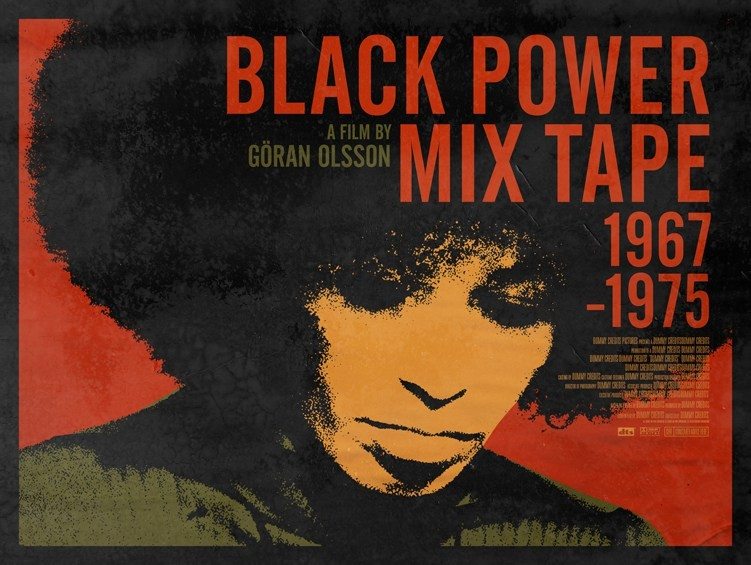
The Black Power Mixtape 1967-1975 – A documentary in 9 chapters. Written and directed by Göran Hugo Olsson (YouTube, 14:52 min.)
Svensk dokumentarfilm fra 2011 om den amerikanske Black Power-bevægelse: filmen “består udelukkende af fantastisk arkivmateriale optaget af nysgerrige svenske tv-journalister på rejse i USA i de omvæltningsfulde år, hvor de sorte amerikanere for første gang samlede sig i kampen for frihed, lighed og borgerrettigheder …” Vist flere gange på DR Tv under titlen ” De sorte Pantere 1967-1975″.
Links:
– The Black Power Mixtape 1967-1975 (filmens website) (PBS, 9 min.)
– ’The Black Power Mixtape’: Danny Glover discusses new doc featuring rare archival footage of Angela Davis, Huey P. Newton, Stokely Carmichael (Democracy Now! January 24, 2011; about 30 min.). Del 1 (11 min.) på YouTube.com; del 2 (7:55 min.); del 3 (12:22 min.)
– Black Power Mixtape 1967-1975: A militant fight against racism brought to life. By Brian Richardson (Socialist Worker, Issue 2277, 12 November 2011)
– The Black Power Mixtape 1967–1975. Edited by Göran Olsson (Haymarket Books, 2014)
– The Black Power era. By Alan Maass (SocialistWorker.org, October 25, 2011)
The socialism of the Black Panthers. By Robert Greene II (Jacobin, 15 March 2016). Review of Stanley Nelson Jr’s Black Panthers: Vanguard of the Revolution: “A new documentary on the Black Panther Party overlooks the group’s socialist core.” See also review by Clare Hurley and Fred Mazelis: No lessons learned (World Socialist Web Site, 9 October 2015) +
review by Gary McFarlane (Socialist Review, Issue 406, October 2015; online at Internet Archive).
Black Panther: from Huey Newton to Wakanda. By Shabbir Lakha (Counterfire, February 24, 2018). Review of Ryan Coogler’s Marvel Comics-film: “Black Panther is a landmark film for representation and presentation, but the politics ignores structural issues of class and race.” See also review by Ken Olende: Black Panther raises tough arguments about liberation (Socialist Worker, Issue 2592, 15 February 2018) + Krystal Kara: Believe the hype about Black Panther (SocialistWorker.org, February 23, 2018) + Nick Barrickman: Ryan Coogler’s Black Panther: A hollow “defining moment” cloaked in identity politics (World Socialist Web Site, 22 February 2018) + Thomas F. McDow: Searching for Wakanda: The African roots of the Black Panther story (Roots, February 15, 2018) + Sameem Rahimi: Behind Wakanda’s utopian vision (Solidarity & Workers’ Liberty, Issue 464, 14 March 2018).
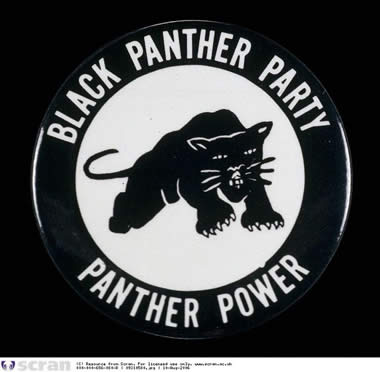
Litteratur:
- Eldridge Cleaver: Sjæl på is: åbne breve til USA (Rhodos, 1969, 185 s.).
- Jørgen Dragsdahl: Det Sorte Panterparti: Amerikas revolutionære avantgarde (Røde Hane, 1970, 202 s.).
- Huey P. Newton: Lad os holde ideen om det revolutionære verdenssamfund og Huey P. Newtons uovervindelige tanker højt (Særtryk af Politisk Arbejde, u.å., 16 s.). Huey P. Newton’s budskab på Boston College 18. november 1970.
- Huey P. Newton: Forsvar for selvforsvar (Politisk Revy, 1971, 80 s.).
- Bobby Seale: Tiden er inde: det sorte panterpartis historie (Gyldendal, 1971, 375 s.).
- Hvis de kommer om morgenen: modstandsrøster. Af Angela Davis, Ruchell Magee, Soledad-brødrene (Tiden, 1972, 176 s.).
- Angela Davis: En selvbiografi. Af Angela Davis (Gyldendal, 1975, 361 s.).
- Bobby Seale: Den ensomme vrede: selvbiografi (Rhodos, 1978, 329 s.).
Se også på Socialistisk Bibliotek:
- Tidslinjen: 22. august 1989, om Huey P. Newton.
- Tidslinjen: 22. oktober 1936, om Bobby Seale.
- Tidslinjen: 1. maj 1998, om Eldridge Cleaver.
- Tidslinjen: 15. november 1998, om Stokeley Carmichael/Kwame Ture.
- Tidslinjen: 4. december 1969, om mordet på Fred Hampton.
- Tidslinjen: 20. januar 1944, om Angela Davis.
OL 1968
De olympiske lege i Mexico City i 1968: Ved medaljeoverrækkelsen i 200 m.-løb for herrer 16. oktober 1968 demonstrerer de amerikanske løbere Tommie Smith (guld) and John Carlos (bronze), bl.a. med Black Power-bevægelsens behandskede knyttede hånd.
Se på Socialistisk Bibliotek:
Linkboxen: Black Power ved OL 1968
Martin Luther King
Martin Luther King fødes i Atlanta, Georgia 15. januar 1929. (Myrdes 4.4.1968 i Memphis, Tennessee).
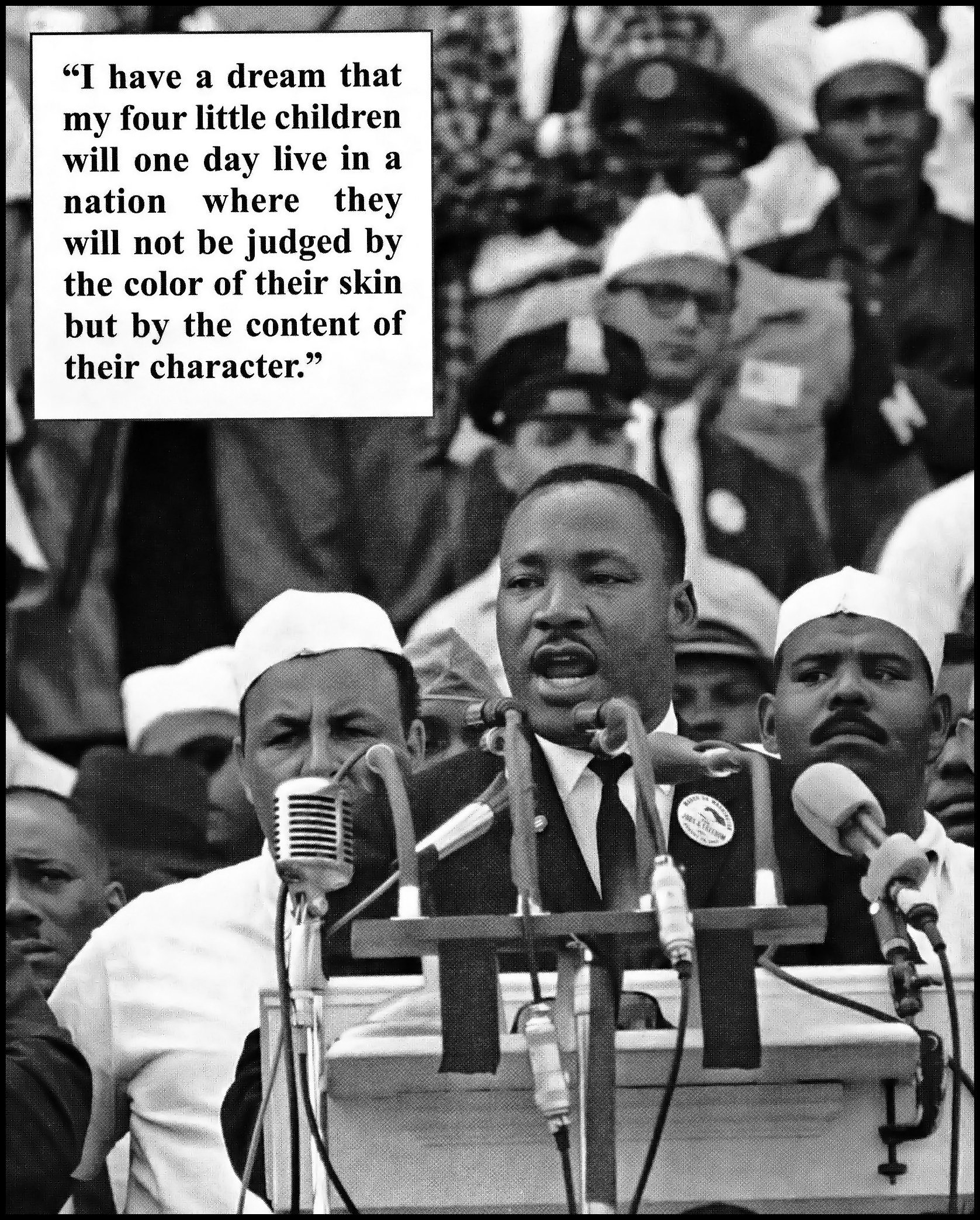
Se:
- Martin Luther King, Jr. (Leksikon.org)
- Martin Luther King: Christian core, Socialist bedrock. By Paul Le Blanc (Against the Current, No.96, January/February 2002). “I will argue here that his outlook represents a remarkable blending of Christian, democratic, and socialist perspectives.”
Se også på Socialistisk Bibliorek:
- Tidslinjen: 15. januar 1929, Martin Luther King fødes
- Tidslinjen: 28. august 1963, om “I have a Dream”-talen
- Tidslinjen: 10. december 1964, om Nobels fredspris til Martin Luther King
- Tidslinjen: 5. april 1968, om mordet på Martin Luther King





















